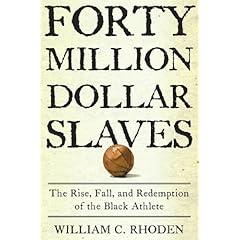A book review

By Dera R Williams (Oakland, CA United States)
Forty Million Dollar Slaves: The Rise, Fall, and Redemption of the Black Athlete
by journalist William C. Rhoden gives a no-holds barred, unadulterated low-down about highly paid black athletes and the juxtaposition of slavery. How did Rhoden come to the conclusion that most Black athletes are highly paid slaves? He starts off methodically detailing the history of African Americans sports dating back to the plantation when slaves were a commodity; property to be used for entertainment as well as labor. Plantation owners would stage fights between slaves from different plantations as weekend amusement. Slaves also became jockeys to plantation owners who owned horses. This became a lucrative business and Black jockeys earned huge payoffs for their owners as well as for themselves on into Reconstruction and into the early 1900s. Blacks dominated horse racing but they were literally squeezed out of the market by greed, jealousy and blatant racism.
Rhoden also details the rise and fall of the Negro Leagues and the tragedy of Arthur "Rube" Foster, who sacrificed everything in the 1930s to organize Black ownership of baseball teams and to give due respect to black baseball players who were unable to play in the major leagues. Ironically, integration saw the end of the Negro Leagues when prime players such as Jackie Robinson and Satchel Paige went to the majors. Rhoden goes on to chronicle the early days of football and basketball. He recounts pioneers in both fields, including Paul Robeson of Rutgers and Raymond Chester of Morgan State and then the Oakland Raiders. It was not until the early 1970s that Southern colleges began recruiting Black football players; at one time the NBA was almost all-white.
Rhoden contends that our young Black athletes, high school, college and professional, lack knowledge of their history in general, and the history of African Americans in sports, in particular. He cites this disconnect for not only the negative, destructive behavior that many of them indulge in but the apathy and lack of political noninvolvement and racial pride. Where are the young Muhammad Alis? But it is the Benjamins that are the prize at the end of the day. Poor inner-city or southern rural Black kids who show exceptional athletic talent become a victim of the "Conveyor Belt." A system, by which they are prepped, coddled and many times exploited at early ages on into high school and college with the main goal to snag the million dollar contracts and lucrative endorsement deals. Who would not want this? But at what cost? Even with all the money Black athletes command, there is still a lacking in coaching, those in top management and almost nil in Black team ownership with the exception of Robert Johnson of the Charlotte Bobcats. Also notable are the few African American sports journalists working to shape and control our image and the lack of exposure to Black agents, attorneys and other specialists to these new multimillionaires.
Kellen Winslow Sr., now an attorney, was a former college football star and played pro for several years and is now in the Hall of Fame. Because he went through the Conveyor Belt, he was able to advocate for his son, Kellen Jr. when the college scouts came courting. He speaks candidly about how college scouts will try to divide the child and parents. He refused to let this happen, often butting heads with his son over where he would go to college. Winslow maintains though that most Black kids do not have a parent, most specifically a father, who will run interference in these matters.
One of the most profound chapters is "The River Jordan: The Dilemma of Neutrality."
Rhoden shows disappointment, hurt, an almost aversion to the beloved Michael Jordan. Jordan's apathy towards Black causes and his neutral stance was a topic of debate when Marcus Book Club met to discuss this book. The members however, came to the agreement that to whom much is given, much is expected and cited Magic Johnson and Dikembe Mutombo as excellent examples of those giving back to their communities. This book is a must-read, especially for young people, both young men and young women and their parents. The history is invaluable and the subject is timely. This is a keeper in one's African American library.















![[npr_newsnotes.jpg]](https://blogger.googleusercontent.com/img/b/R29vZ2xl/AVvXsEjrutmUkZxwkFeBaRIQmhH5IjbSRus-kQEYwA_IbtQXARIcnJdZsw0tyuY63HLYZjQM-YtcE3niv6L_w73Bm9UQIrLrhurYZVxJP1HiHSpgUPM0xzBPZJIYjmSA06qU1uO9sjgFkTMkWjA/s1600/npr_newsnotes.jpg)



